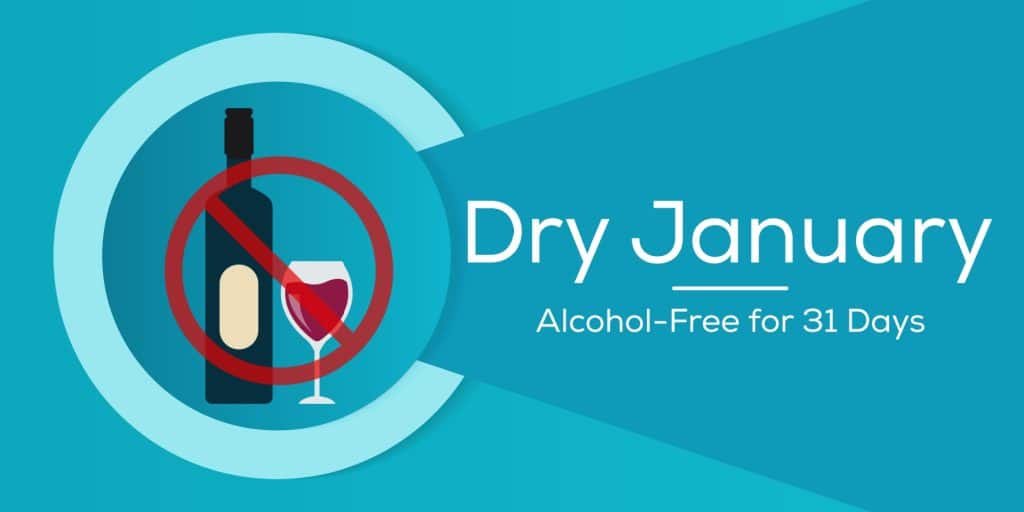
Across the world, thousands of people participate in Dry January, a month-long campaign that challenges its participants to go alcohol-free for 31 days. For some individuals, this is a simple adjustment to make, but others find it much more difficult.
If you have a hard time abstaining from alcohol, it could indicate a deeper issue with your drinking habits. Continue reading below to learn more about what that means, when to be concerned, and how to get help.
Table of Contents
The Growth of Dry January


In 2013, Alcohol Change UK launched Dry January as a public health campaign to raise awareness about alcohol-related health concerns, such as liver disease. Since then, the number of participants has grown exponentially each year, with more and more people acknowledging the potential health benefits of abstinence.
In fact, current surveys show that as many as one in seven British adults plan to take part in Dry January this year. As the challenge continues to expand worldwide, parts of the United States could reflect similar numbers. The appeal has grown as successful Dry January participants report seeing benefits like improved sleep, weight loss, higher energy levels, clearer skin, and more.
However, the increase in participation also means that more people may struggle to commit to a month without alcohol. When they try to join in only to find that they can’t stop drinking alcohol, one question can chase away their motivation: Why is it so hard?
Why Is Dry January Hard?
While some people can cut alcohol out of their lives without much of an issue, others must regularly fight the temptation to drink. If Dry January is difficult for you, there are a few potential reasons why. Below, we’ve outlined two of the most common explanations for why it can be challenging to stop drinking alcohol.
Social Pressure to Drink Alcohol
One of the most prominent challenges people face during Dry January involves social situations with alcohol. For example, many people regularly get drinks with their co-workers or invite their friends over for a glass of wine. Dry January interrupts these activities and forces participants to approach them differently.
Even if someone replaces alcohol with a nonalcoholic drink like sparkling water, they may still feel left out or like they should be drinking alcohol instead. This can even be true if their friends support their efforts and don’t outright pressure them to drink. The temptation remains regardless, and the only way to remove it would be to stop participating in social events.
The National Institute of Alcohol Abuse and Alcoholism offers resources to teach people how to overcome social pressure and refuse drinks. Although, if alcohol is a normal part of someone’s life, it can be difficult to internalize these lessons. Instead, someone may decide to end their Dry January attempt early and start drinking socially again.
Alcohol Withdrawal Symptoms
Another challenge people may face during Dry January involves withdrawal symptoms. If, after someone stops drinking, they encounter symptoms like sweating, tremors, nausea, or high blood pressure, they are likely experiencing withdrawal. However, unlike with social pressure, withdrawal symptoms suggest an intrinsic hurdle that may be cause for further concern.
This is because people often experience withdrawal symptoms due to a physical dependence on a substance—in this case, alcohol. In other words, their body has grown so accustomed to it that it can no longer function properly without alcohol in the bloodstream.
Dependence is something that develops gradually after someone drinks alcohol for a long period of time. It is a potential sign of alcohol addiction, and as such, it should be treated very seriously once identified. If your Dry January is stopped by withdrawal, you should consider looking for other signs of addiction in your life.
Signs of Alcohol Addiction
If you experience withdrawal symptoms when you attempt Dry January, that alone is not a guarantee that you have an alcohol addiction. However, it does warrant taking the time to further evaluate your relationship with drinking. There are several other red flags to watch out for that can help clarify whether or not someone is misusing alcohol.
Other signs of alcoholism include:
- Wanting to stop drinking but being unable to
- Hiding or lying about alcohol use
- Drinking to forget problems
- Spending most time buying, drinking, or recovering from alcohol
- Continuing to drink despite knowing it creates problems
- Needing to drink higher amounts of alcohol to achieve the same effect
If more than one of these rings true, it may be time to consider changing your drinking habits. Addiction is not something that will go away on its own. It is crucial to acknowledge the problem and take proactive steps to heal from it.
Dry January Is Not the Solution to Addiction


For many people, even those looking to stop drinking permanently, Dry January serves as a realistic, short-term goal to decrease their alcohol consumption. However, it’s important to remember that the month only lasts 31 days. After that, someone will need to come up with a new sobriety goal or risk returning to their previous drinking habits.
Furthermore, as mentioned previously, quitting alcohol suddenly (or “cold turkey”) can trigger unpleasant withdrawal symptoms. In rare cases, some of these symptoms can even be dangerous to confront alone, such as seizures. For this reason, attempting Dry January if you are dependent on alcohol may offer more risk than reward.
With that being said, there are other steps you can take to decrease or eliminate your alcohol use. Namely, professional alcohol addiction treatment can provide the resources you need to stop drinking alcohol safely and successfully.
Alcohol Addiction Treatment
The Blackberry Center is a mental health and addiction treatment center in St. Cloud, Florida. We offer an assortment of treatment programs developed to support individuals with addictions. If you struggle with Dry January, one of our programs may make sobriety easier to attain.
For many individuals, the first step of addiction recovery often involves a medical detox. If Dry January is difficult for you because of withdrawal symptoms, a detox program can enable you to manage those symptoms in a safe, comfortable place where you have 24/7 medical support.
Following detox, many patients go on to enroll in a more in-depth alcohol addiction treatment program. This program tackles the mental obstacles and emotional ramifications associated with addiction. Patients learn healthy coping skills by participating in a variety of evidence-based treatment options, such as:
- Individual psychotherapy
- Group therapy
- Medication evaluation and management
- Addiction education
- Skills-building workshops
- Recreational therapy
- Discharge planning
- Support group referrals
- Follow-up care
You can still take part in Dry January if you suspect you have an alcohol addiction. However, the safest way for you to participate may involve reaching out to an addiction treatment center. They can kickstart your recovery and improve your chances of successfully abstaining from alcohol.
Contact Us Today
If completing Dry January proves to be a major challenge for you, you may have an unhealthy relationship with alcohol. Fortunately, the Blackberry Center can help you assess your alcohol intake and guide you toward long-term sobriety.
Between our medical detox, therapeutic programming, and aftercare planning, we provide a full continuum of care for individuals looking to overcome substance use disorder. With the added benefits of individualized treatment plans and a tranquil, retreat-like environment, we create an uplifting atmosphere for our patients that makes it easy to focus on recovery.
To learn more about our addiction treatment programs, call our admissions experts at 888-512-9802 or submit a confidential contact form online. Don’t wait any longer to get help. This year, make a positive change for your own well-being.
The post Dry January Is Hard for Me: How Do I Stay Sober? appeared first on The Blackberry Center of Central Florida.
Source
Original Author: The Blackberry Center

